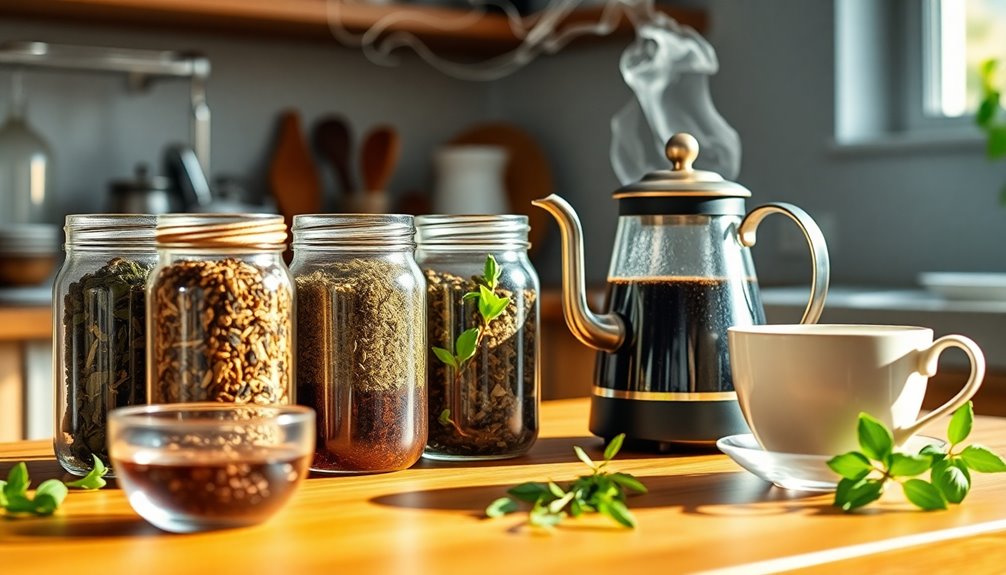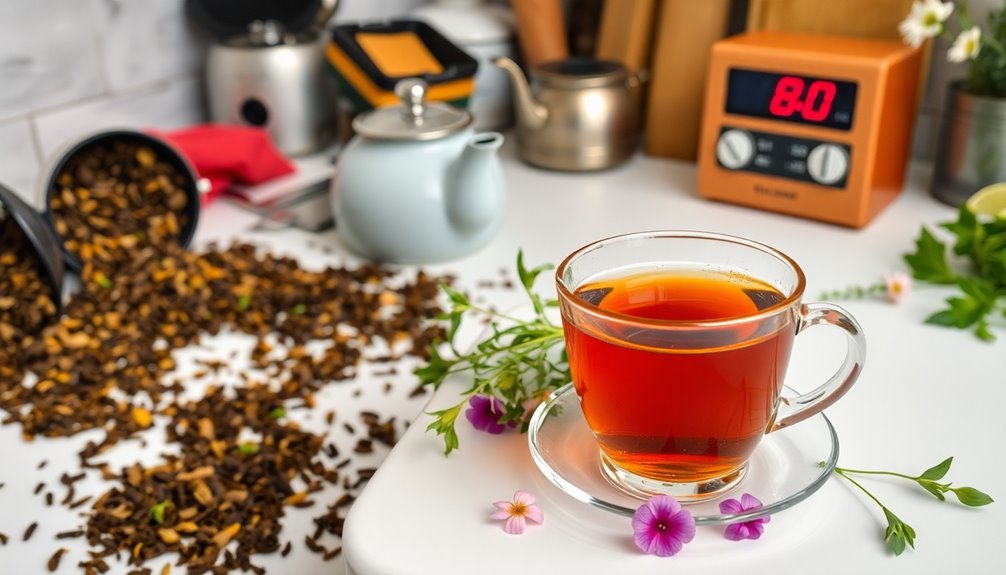By choosing ethical and sustainable tea brewing methods, you support fair wages and better working conditions for farmers, reduce environmental impact, and preserve cultural traditions. Using organic or fair trade teas, eco-friendly equipment, and reusable infusers promotes healthier soil, cleaner water, and less waste. Your actions help guarantee a more equitable and environmentally responsible industry. To discover how these practices can enhance both your tea experience and contribute to positive change, keep exploring the options available.
Key Takeaways
- Use fair trade-certified tea leaves to support ethical labor practices and ensure farmers receive fair wages.
- Opt for organic teas cultivated without synthetic chemicals to promote environmental sustainability and healthier ecosystems.
- Choose loose-leaf teas over single-use bags to reduce packaging waste and minimize environmental impact.
- Brew tea using reusable infusers and eco-friendly tools to lessen reliance on disposable plastics.
- Support brands committed to ethical sourcing and sustainable practices to encourage industry-wide responsibility.

As tea enthusiasts seek flavorful brews, it is important to take into account the ethics and sustainability behind your brewing techniques. The choices you make, from sourcing to preparation, can markedly impact the environment and the communities involved in tea production. One of the key factors to consider is fair trade practices. When you select tea labeled as fair trade, you’re supporting farmers who receive fair wages and work under better conditions. This helps promote social equity and encourages ethical treatment of workers, ensuring they aren’t exploited for cheap labor. By prioritizing fair trade, you also contribute to sustainable livelihoods for tea growers, empowering communities and reducing poverty in tea-producing regions.
Supporting fair trade in tea promotes ethical treatment, better wages, and sustainable livelihoods for farmers and communities.
Another essential aspect is organic farming. Opting for organic teas means choosing products cultivated without synthetic pesticides, fertilizers, or genetically modified organisms. Organic farming methods promote healthier soil, cleaner water sources, and a smaller carbon footprint compared to conventional agriculture. When you brew organic tea, you’re supporting farming practices that respect the environment and protect biodiversity. These methods help maintain the land’s natural balance, which is vital for long-term sustainability. Additionally, organic teas often undergo fewer chemical treatments, making your brew safer and healthier for your body.
Being mindful of these practices also influences how you approach your brewing process. For example, purchasing tea from certified fair trade or organic sources encourages producers to uphold higher standards that prioritize environmental stewardship and social responsibility. It’s not just about the taste; it’s about the story behind each cup. You can further support sustainable practices by choosing loose-leaf teas over bagged options, reducing waste in the process. Using reusable tea infusers or filters minimizes single-use plastics, aligning your habits with eco-friendly principles.
Incorporating these considerations into your routine doesn’t mean sacrificing quality or flavor. Many fair trade and organic teas boast rich, complex profiles that rival conventional options. By making informed choices, you’re actively participating in a more ethical and sustainable tea industry. Your selections send a message to producers and brands that consumers care about how their products are made, motivating more companies to adopt responsible practices. Ultimately, every cup becomes an opportunity to enjoy tea while contributing to a healthier planet and fairer world for everyone involved in its journey from farm to cup. Supporting ethical sourcing and sustainable farming methods can also help preserve the cultural heritage and traditional knowledge associated with tea cultivation.
Frequently Asked Questions
How Do Ethical Sourcing Practices Impact Tea Flavor Quality?
When you choose teas with ethical sourcing practices, you support farmers who prioritize quality and sustainable methods, which preserves flavor integrity. Sourcing transparency lets you see exactly where your tea comes from, ensuring it’s grown responsibly. This often results in better-tasting tea because ethical practices reduce harmful chemicals and promote healthy soil. So, by selecting ethically sourced tea, you’re enhancing your brew’s flavor and contributing to a more sustainable, transparent supply chain.
Are Organic Teas Always More Sustainable Than Conventional Ones?
Organic teas aren’t always more sustainable than conventional ones, like a cloudy sky isn’t always rainy. While organic farming often reduces pesticide use and promotes crop diversity, it can also require more land and resources. You should consider factors like local practices and environmental impact, not just certification. Sustainable choices depend on how tea is grown and managed, making it essential to look beyond labels for the most eco-friendly option.
What Certifications Ensure a Tea’s Ethical and Sustainable Production?
You can verify a tea’s ethical and sustainable production by looking for certifications like Fair Trade and Rainforest Alliance. Fair Trade guarantees fair wages, good working conditions, and community benefits, while Rainforest Alliance promotes environmental conservation and social responsibility. When you see these labels, you’re supporting farmers who follow sustainable practices, helping protect the environment and improve workers’ lives. Always check for these certifications to make responsible choices.
How Can Consumers Verify the Sustainability Claims of Tea Brands?
You can verify a tea brand’s sustainability claims by looking for third-party verification seals like Fair Trade or Rainforest Alliance. Also, check their transparency reports, which often detail their sourcing practices, environmental impact, and fair labor standards. By researching these aspects, you guarantee the company genuinely adheres to ethical and sustainable practices, rather than just marketing claims, helping you make responsible choices when selecting your tea.
Do Traditional Brewing Methods Align With Modern Sustainability Standards?
Traditional brewing methods act as a bridge, symbolizing cultural preservation amid modern change. While they often rely on natural, less wasteful processes, they may not fully meet today’s sustainability standards driven by technological innovation. You can see this as a dance between honoring age-old customs and embracing eco-friendly advancements. By supporting brands that blend tradition with innovation, you help preserve cultural heritage while advancing sustainability goals.
Conclusion
By choosing ethical and sustainable tea brewing methods, you’re making a positive difference—from supporting fair trade to reducing waste. Some might think these choices are inconvenient or expensive, but the impact on farmers, the environment, and future generations is worth it. Every small step matters, so next time you brew, remember your choices can help create a more just and sustainable world. Your mindful tea ritual can truly make a difference—one cup at a time.









